It can be alarming to watch a dog constantly eating grass, especially when it happens frequently or in large amounts.
While occasional grazing may seem harmless, persistent grass-eating can sometimes signal an underlying issue that pet owners should not ignore.
We outline the common reasons why a dog may constantly eat grass, what you can do at home, and when to seek veterinary help.
Dog Constantly Eating Grass — Why It Happens
Dogs may constantly eat grass for reasons ranging from natural behavior to medical conditions. Some dogs chew grass out of boredom or instinct, while others may do so to relieve nausea, stomach upset, or digestive discomfort.
Nutritional deficiencies, anxiety, and even underlying health problems like gastrointestinal disease can also play a role. In some cases, grass eating becomes habitual, especially in dogs that spend a lot of time outdoors.

Dog Constantly Eating Grass: Common Causes
Instinctual Behavior
Dogs are natural scavengers, and grass eating may be a leftover instinct from their ancestors.
Wild canines often consumed plant matter found in prey stomachs, making grass a familiar part of their diet.
For many pets, eating grass simply feels natural and does not necessarily indicate illness. However, when it becomes constant, owners should pay closer attention.
Read more: Dog Eating Grass and Not Eating (Here’s Why)
Upset Stomach or Nausea
One of the most common reasons dogs eat grass is to relieve digestive discomfort. Some dogs vomit after consuming grass, which may temporarily ease nausea or stomach upset.
If a dog is constantly seeking out grass and often vomiting afterward, this could point to gastrointestinal irritation or a chronic stomach issue.
Nutritional Deficiency
Dogs lacking certain nutrients, especially fiber, may turn to grass as a natural supplement. A diet low in fiber or poorly balanced can drive a dog to constantly graze in search of what their body needs.
If grass eating coincides with weight loss, dull coat, or changes in appetite, nutritional imbalance could be the cause.
Anxiety or Boredom
Dogs sometimes develop repetitive behaviors, such as constant grass eating, when they are anxious, stressed, or understimulated.
This behavior can serve as a self-soothing mechanism, similar to how some dogs lick excessively or chew objects when nervous.
High-energy dogs left without enough mental or physical exercise may be especially prone to grazing habits.
Gastrointestinal Disorders
Conditions such as gastritis, inflammatory bowel disease, or parasites can cause dogs to seek out grass as a way to cope with discomfort.
In these cases, constant grass eating is often accompanied by other symptoms, including diarrhea, vomiting, bloating, or weight loss.
Chronic gastrointestinal issues should never be overlooked, as they require veterinary evaluation and treatment.
Habit Formation
Sometimes, grass eating simply becomes a habit. If a dog has eaten grass repeatedly in the past without consequence, they may continue to do so whenever they are outdoors.
Habitual grazing may not indicate illness, but it should still be monitored to ensure it does not escalate into excessive consumption or exposure to pesticides and chemicals.
What to Do If Your Dog Is Constantly Eating Grass
If your dog is constantly eating grass but otherwise appears healthy, start by monitoring their behavior closely. Offer a balanced, high-quality diet that includes adequate fiber, as nutritional deficiencies are a common trigger.
Providing enrichment, interactive play, and daily exercise can also reduce grazing caused by boredom or stress.
If grass eating seems tied to stomach upset, try feeding smaller, more frequent meals to ease digestion. Some dogs benefit from probiotics or digestive supplements recommended by a veterinarian.
Always make sure the grass your dog has access to is free of pesticides, fertilizers, or toxic plants that could worsen their condition.
When to Call or Visit Your Vet
Persistent grass eating combined with other symptoms should always be taken seriously.
Contact your veterinarian if your dog also shows vomiting, diarrhea, weight loss, lethargy, or refusal to eat regular food. These could indicate underlying gastrointestinal disease, parasites, or more serious health conditions.
If your dog vomits frequently after eating grass, eats non-stop throughout the day, or seems distressed during or after grazing, veterinary evaluation is essential.
Additionally, if you suspect your dog has ingested chemically treated grass or toxic plants, seek emergency care immediately.
Read more: Dog Constantly Urinating in House (What this could mean)
Key Takeaway
Dogs may constantly eat grass for instinctual, behavioral, nutritional, or medical reasons. While occasional grazing can be normal, constant grass eating should never be ignored.
Providing a balanced diet, reducing stress, and ensuring a stimulating environment can help manage the behavior.
But if your dog shows additional symptoms or distress, contacting your veterinarian is the safest step.
Caring for a dog means noticing small changes before they become big problems, and constant grass eating is one signal worth paying attention to.
